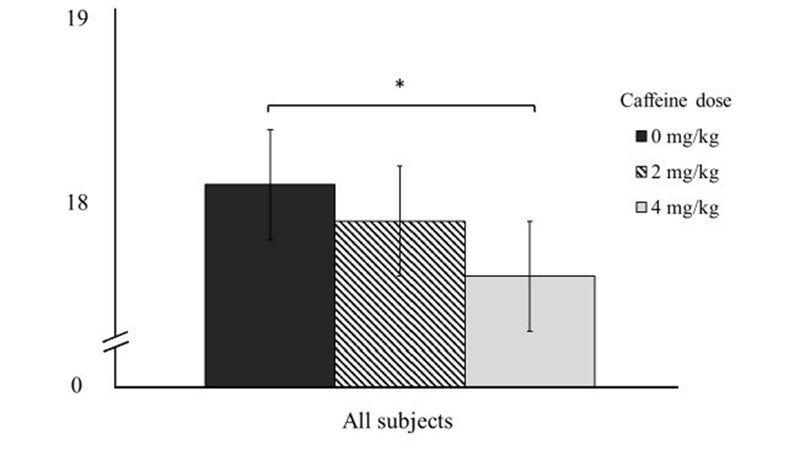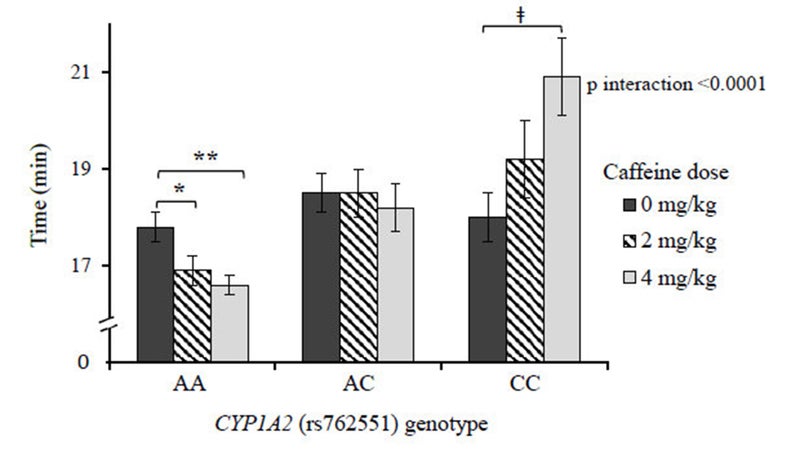Sometimes I feel bad that I’m such a supplement skeptic. “Do you think Pill X will make me a better athlete with healthier skin and more regular bowel movements?” someone will ask, pointing me to a small unblinded study with four subjects, all of whom are employed by the company selling Pill X. “Sorry, but no,” I’ll say. Then I’ll try to cushion the blow with some good news: “Caffeine works, though. For almost everything.”
It’s true that caffeine’s power as a performance booster is uniquely well-supported by a big pile of well-designed scientific studies. There’s even about its athletic applications, written by some of the most respected sports nutrition researchers in the world. Study after study shows that caffeine enhances performance, particularly in endurance events, by a few percent—on average.
But a few years ago, researchers started to look more closely at the individual variability in response to caffeine. Every study has some more or less random scatter in its results: If the average improvement is 3 percent, some people might actually get 6 percent better, while others don’t improve at all. But not all scatter is random. A few years ago, evidence that some people were consistently more likely to benefit from caffeine than others, and some might actually get slower after taking caffeine, based on their genetic profile. The biggest study to date on this topic has in Medicine and Science in Sports and Exercise, and the results are striking.
The study was conducted by Nanci Guest, a sports dietitian and doctoral candidate at the University of Toronto, and her supervisor Ahmed El-Sohemy, a professor of nutritional science. They put 101 well-trained male (more on that below) athletes from a variety of sports (everything from marathon running to boxing to soccer) through a series of three 10K cycling time trials. Before each one, the athletes received either a placebo, a low dose of caffeine (2 milligrams per kilogram of body weight), or a higher dose (4 mg/kg). If you weigh 150 pounds, that corresponds to either 136 or 272 mg of caffeine. (A has 100 to 160 mg of caffeine, and has 200 mg.)
As expected, caffeine boosted performance. The athletes cycled 3 percent faster with the high dose of caffeine compared to the placebo. The improvement with the lower dose wasn’t statistically significant. Here’s what those results looked like, showing the cycling time in minutes on the vertical axis:

That’s where these studies usually end: Caffeine works, so go forth and get caffeinated. But in this case, the researchers also took a spit test to determine which version of a gene called CYP1A2 each subject had. More than 95 percent of the caffeine you drink is metabolized by an enzyme encoded by this gene. People with the AA version of the gene are considered “fast” metabolizers, breaking down the caffeine rapidly. People with the AC or CC version are “slow” metabolizers, with the latter group especially slow, meaning that the caffeine they drink lingers in their bodies for much longer.
Take a look at what happens when you break down the results by genotype:

In the AA group (the fast metabolizers), caffeine is helpful, and the more the better. They get 4.8 percent faster at the low caffeine dose and 6.8 percent faster at the high caffeine dose. In the CC group (the very slow metabolizers), the pattern is the opposite: The more caffeine they get, the slower they go. At the higher dose, they’re 13.7 percent slower! In the middle AC group, it seems to be pretty much a wash, with no significant difference either way.
A ton of questions spring from these results. First of all, why the huge difference? The answer, for now, is that we don’t know. The likely explanation is that caffeine has a mix of positive and negative effects in everyone. The positive effects are likely in the brain, leading to . The negative effects, Guest and El-Sohemy speculate, could be a result of blood vessels constricting in response to caffeine, which would impair blood flow to muscles during exercise. Everyone gets the positive boost when they ingest caffeine, but perhaps the negative effects stick around much longer in the slow metabolizers and ultimately outweigh the benefits. That raises the question of how the results might change in an event lasting, say, one minute or, at the opposite end of the spectrum, several hours. We can only be sure that the particular balance of positive and negative effects seen here applies for a duration of (on average) 18 minutes.
In the study group, 49 percent of people were in the AA group. They’re the lucky ones in terms of getting a caffeine boost. Of the rest of the group, 43 percent were AC (slow) and just 8 percent were CC (very slow). This distribution is similar to what’s seen in other studies, suggesting that it’s relatively rare to get negative effects from caffeine but quite common to have no significant effect. Interestingly, there’s apparently no link between this gene and habitual caffeine consumption levels: Your rate of caffeine metabolism isn’t what determines whether you like caffeine.
Another interesting wrinkle is that the effects of caffeine metabolism aren’t limited to athletic performance. In , El-Sohemy and his colleagues showed that fast metabolizers have a lower risk of heart attack if they drink one to three cups of coffee a day, perhaps thanks to its antioxidants and other health-promoting elements. In contrast, slow metabolizers have a 36 percent increase in heart attack risk if they drink two to three cups of coffee a day and a 64 percent increase if they drink four cups or more.
It’s also important to note that the subjects in this study were all male. In theory, El-Sohemy says, they would expect to see similar results in female athletes, and the researchers hope to extend the findings to women in a separate study. There’s some evidence that hormonal contraceptives can affect the activity of the caffeine metabolism enzyme, which raises the possibility that there might be some subtle effects related to the female hormonal cycle. The current study required all subjects to abstain from caffeine for four weeks during their four weekly visits to the lab. To study the question properly, Guest notes, women would have to come into the lab at the same time each month to ensure similar hormone levels, which would require four months of complete caffeine abstention. That practical barrier is why they started with the male study.
The big question, of course, is what you should do with this information. And at this point, it’s important to note that El-Sohemy is the founder of a company called Nutrigenomix, which offers genetic testing for personalized nutrition, including the caffeine metabolism gene. Guest serves on the company’s scientific advisory board. That’s exactly the sort of conflict I was making fun of at the top of this piece, and it should give us pause. I do think the study design here is really strong—the sample size is huge by the standards of this area of research, and supplement allocation was double-blinded so the researchers didn’t know who was getting the placebo when. (Remarkably, only three of the 101 subjects correctly guessed which pill they had received each time when they were debriefed after the study.) And there has been that reached similar conclusions.
Still, I remain on the fence about the merits of getting tested to figure out how caffeine is likely to affect your performance and health. The hype about genetic predictions often outpaces the results—for example, a major attempt to use genotype to predict who would benefit from a low-fat versus a low-carb diet in real-world testing last month. Still, these results are intriguing, and if I drank coffee (which, as it happens, I don’t), I’d certainly be curious about which genotype group I fell into.
In the end, it’s also important not to fall into the same trap we originally fell into, assuming that average results reflect everyone’s individual reality. When I initially posted the abstract of this study on Twitter, I got a response from , a running legend who once held the U.S. high school record for the 3,000 meters, competed at the 1992 Olympics, and set a 45–59 age group world record of 4:12.33 for the indoor mile. “Strange,” . “I’m CC, and I find it hard to work out without a caffeine boost. Placebo effect?”
I don’t know why Trautmann, who supposedly should get slower after taking caffeine, finds it to be an essential workout aid. It’s possible that his perceptions are wrong—that he feels better working out with caffeine, but he actually runs slower. Or it’s possible that other factors in that delicate balance between positive and negative effects are dominant. Maybe he’s ultrasensitive to the positive effects or insensitive to the negative effects. But the bottom line is that for a runner who has accomplished as much as Trautmann has, I would be very wary of telling him he’s been doing it all wrong on the basis of a DNA test. And the rest of us, even at less rarefied levels, should be similarly cautious.
My new book, , with a foreword by Malcolm Gladwell, is now available! For more, join me on and , and sign up for the Sweat Science .


